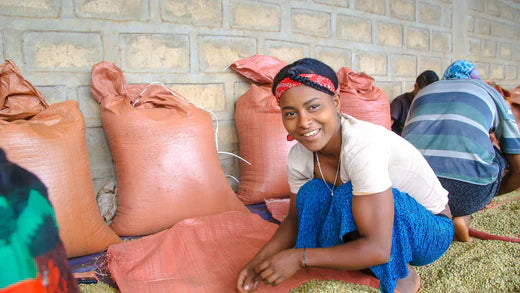Our experience has taught us that the coffee that is healthiest for the consumer is also healthy for everyone in the supply chain and for the earth. The lab testing we have done over the past seven years supports this statement. Purity Coffee has entered a new phase of its development: The health of the coffee beverage is directly linked to the health of the entire supply chain of coffee, starting at the farm level. We’ve written about how we have evolved since our founding in 2015, including our investment in a coffee farm in Colombia. The more involved we got at the farm level, the more connections we made to the wider world of regenerative organic agriculture and climate change issues.
At the end of last year, we joined the Cool Farm Alliance, “a collaborative, pre-competitive community with a unified voice about the journey in agriculture from depletion to regeneration,” along with dozens of other companies, like Ben & Jerry’s, Campbell’s, the Rainforest Alliance and Fair Trade International.
The term "cool farm" emphasizes the idea of farming in a way that is environmentally friendly and helps mitigate climate change by reducing greenhouse gas emissions and promoting carbon sequestration in soils. It's essentially about farming in a manner that is both ecologically sustainable and economically viable. Coffee that’s grown in a way that’s good for the planet is better for your health, and aligns with the same standards that define high quality organic cold brew coffee.
A "cool farm" is a farm that sequesters carbon from the atmosphere and puts it into the soil, where it belongs, reducing its environmental impact while maintaining or increasing productivity. These practices often involve sustainable agriculture techniques, such as minimizing the use of synthetic fertilizers and pesticides, implementing conservation tillage methods, optimizing water use efficiency, promoting biodiversity, and adopting renewable energy sources. Coffee that’s grown in a way that’s good for the planet is better for your health.
On the other hand, a "hot farm" releases carbon into the atmosphere and has a significant environmental impact, potentially contributing to issues such as increased greenhouse gas emissions, deforestation, soil degradation, water pollution, and loss of biodiversity. These farms rely heavily on intensive agricultural practices, monoculture farming, heavy chemical inputs, and unsustainable land management practices. Not only is this practice bad for the environment,it also affects the nutrient density of the coffee.
Most commercial coffee farms can have severe environmental impacts, making them “hot farms," including:
- Deforestation: Many coffee farms clear indigenous forests to make way for coffee plantations. This loss of natural habitat leads to biodiversity loss and habitat fragmentation.
- Water usage: Coffee farming often requires significant amounts of water for irrigation and processing of the harvest. Unless water and lands are managed conscientiously, fertilizers, pesticides, and coffee effluent end up in natural streams (soil erosion, too), further reducing biodiversity and clean habitats for other species.
- Soil degradation: Intensive coffee farming practices, such as monoculture and excessive tillage, can degrade soil quality over time, leading to erosion, loss of soil fertility, and reduced long-term productivity.
- Greenhouse gas emissions: Coffee farming contributes to greenhouse gas emissions through land clearing, processing, waste management, and transportation (releasing carbon dioxide and methane into the atmosphere), fertilizer use and soil management, which results in emissions of nitrous oxide.
Regenerative organic coffee farming aims to restore and enhance the health of ecosystems while also producing coffee sustainably, making them “cool farms," including:
- Soil health: Building soil health through techniques such as cover cropping, composting, crop rotation, increasing organic matter content, adding biochar and enhancing soil fertility, which ultimately leads to better water retention, reduced erosion, and increased carbon sequestration.
- Biodiversity conservation: Creating habitat for varieties of plant and animal species by preserving native vegetation, planting shade trees, and avoiding the use of synthetic chemicals that can harm wildlife.
- Water conservation: Improving soil structure and increasing water infiltration rates reduces the need for irrigation and minimizes water runoff, which can carry pollutants into waterways, and healthy soil microbiomes contribute to natural water filtration and purification processes.
- Carbon sequestration: Using biochar and promoting the growth of perennial vegetation, such as shade trees and cover crops, helps mitigate climate change by removing carbon dioxide from the atmosphere and storing it in the soil.
Purity Coffee® has created a network of “cool farms” that focus specifically on regenerative organic farming, agroforestry, soil conservation, water conservation, carbon sequestration through the use of biochar, renewable energy use from biodigesters, and biodiversity conservation. All of our coffees now come from these farms, and producers are rewarded for each new environmental innovation that they implement. We believe this will support healthier people producing healthier coffees.
By improving soil health, healthier and more nutrient-dense coffee is achievable. Healthy soils rich in organic matter provide plants with a wide range of essential nutrients, resulting in coffee that is more nutritious and beneficial for human health. Studies have demonstrated that crops grown in soils with higher organic matter content and greater microbial activity tend to have higher levels of certain nutrients, antioxidants, vitamins, and minerals compared to conventionally grown crops. For example, mycorrhizal fungi can enhance the uptake of nutrients such as phosphorus and zinc by forming symbiotic relationships with plant roots.
Organic farming practices use natural methods for pest and disease control, which are generally considered safer for farmers, farmworkers, and consumers. By minimizing chemical inputs and promoting natural soil fertility, organic farms reduce the risk of contamination from synthetic chemicals, heavy metals, and other harmful substances that can be found in conventionally farmed soils.
The environmental benefits of regenerative organic “cool” farming, such as reduced greenhouse gas emissions, improved water quality, and conservation of biodiversity, indirectly contribute to human health. A healthier environment supports overall well-being and reduces the risk of environmental factors negatively impacting human health.
Research on the connection between soil health and human nutrition is an evolving field of study, and Purity Cool Farms is at the forefront of these studies for coffee. There is so much to learn! We are seeking partners to help us continue to improve soil health and continue to create healthier coffees.These new best practices will become standards for this entirely new category of coffee. We want an open forum and discussions that will help us advance the practices that can be implemented to improve access to these great coffees.
Isn’t it time for us all to be drinking cool coffee? A commitment to supporting sustainable, regenerative agriculture helps to promote a healthier you, a healthier planet, and a more equitable coffee industry.
2 comments








I like the cool farming method and what it means to all of us. It’s a great tasting coffee
So pleased to support these efforts to practice proper stewardship with our gifts of land and nourishing crops.
Leave a comment